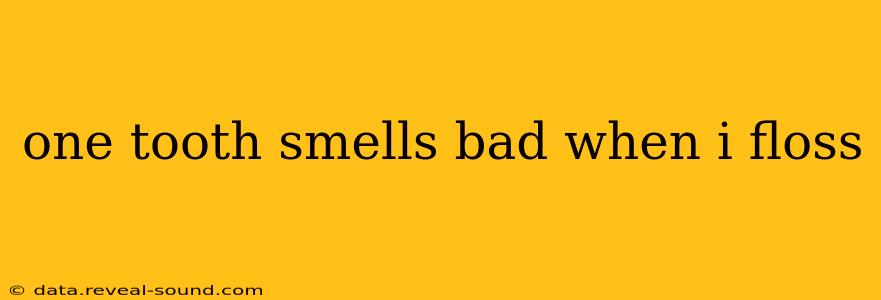Flossing is crucial for maintaining good oral hygiene, but sometimes you might encounter a nasty surprise: one tooth smells particularly bad after flossing. This isn't just unpleasant; it often signals an underlying dental problem. This guide will help you understand the possible causes and what you can do about it.
Why Does One Tooth Smell Bad After Flossing?
This localized bad odor usually points to an issue concentrated around that specific tooth. Several factors could be at play:
-
Food Debris Trapped Between Teeth: Even diligent brushing might miss food particles wedged tightly between teeth. Flossing dislodges this debris, revealing its unpleasant aroma. This is the most common and easily remedied cause.
-
Gum Disease (Gingivitis or Periodontitis): Inflamed gums harbor bacteria, leading to a foul smell. If the odor is persistent and accompanied by bleeding gums, swelling, or redness, it's a serious sign you need to see a dentist immediately.
-
Cavities (Dental Caries): Decaying tooth structure provides a perfect breeding ground for bacteria. Flossing might expose the decayed area, releasing a putrid smell. Untreated cavities can lead to significant dental problems.
-
Abscess: A tooth abscess is a pocket of pus formed at the root of a tooth due to infection. This is a very serious condition requiring immediate professional dental attention. The odor will be particularly strong and foul-smelling.
-
Damaged or Loose Filling: A cracked or poorly fitted filling can trap bacteria and food particles, creating a breeding ground for odor-causing bacteria.
-
Poorly Maintained Dental Implant or Crown: Similar to fillings, bacteria can accumulate under ill-fitting crowns or around dental implants, resulting in a bad smell.
-
Dry Socket (Alveolitis): This occurs after a tooth extraction, characterized by an exposed bone socket that becomes infected. The smell is often described as extremely unpleasant and is accompanied by significant pain.
How Can I Fix a Bad-Smelling Tooth?
The solution depends entirely on the underlying cause. Here's a breakdown:
1. Improve Your Flossing Technique:
Ensure you're flossing correctly. Use a gentle, C-shaped motion to hug the tooth's surface and remove plaque and food particles effectively from between your teeth and along the gumline. Don't be afraid to use plenty of floss.
2. Increase Brushing Frequency and Thoroughness:
Brush your teeth twice a day for at least two minutes each time, using fluoride toothpaste. Pay particular attention to the area around the problematic tooth.
3. Use Mouthwash:
Therapeutic mouthwashes containing chlorhexidine or essential oils can help temporarily control bad breath. However, mouthwash is a supplement to proper brushing and flossing, not a replacement.
4. See Your Dentist Immediately:
If the bad smell persists despite improved oral hygiene, or if it's accompanied by other symptoms like pain, swelling, or bleeding gums, schedule an appointment with your dentist right away. They can properly diagnose the problem and recommend the appropriate treatment.
What if the Smell is Accompanied by Other Symptoms?
This is crucial! Pay close attention to accompanying symptoms:
What if my gums are bleeding?
Bleeding gums often indicate gingivitis, the early stage of gum disease. See your dentist promptly.
What if my tooth is painful?
Pain suggests a possible cavity, abscess, or other infection requiring professional dental care. Don't delay seeking help.
What if I have a visible hole or decay in my tooth?
This is a clear indication of a cavity and necessitates immediate dental attention to prevent further damage.
What if the bad smell is extreme or I notice swelling?
Severe odor and swelling might point to a serious infection such as an abscess, requiring urgent professional care.
Addressing a bad-smelling tooth requires proactive steps. While improved oral hygiene often resolves minor issues, persistent odor necessitates a visit to your dentist for proper diagnosis and treatment. Don't let a seemingly small problem escalate into a significant dental issue. Your oral health is crucial to your overall well-being.
